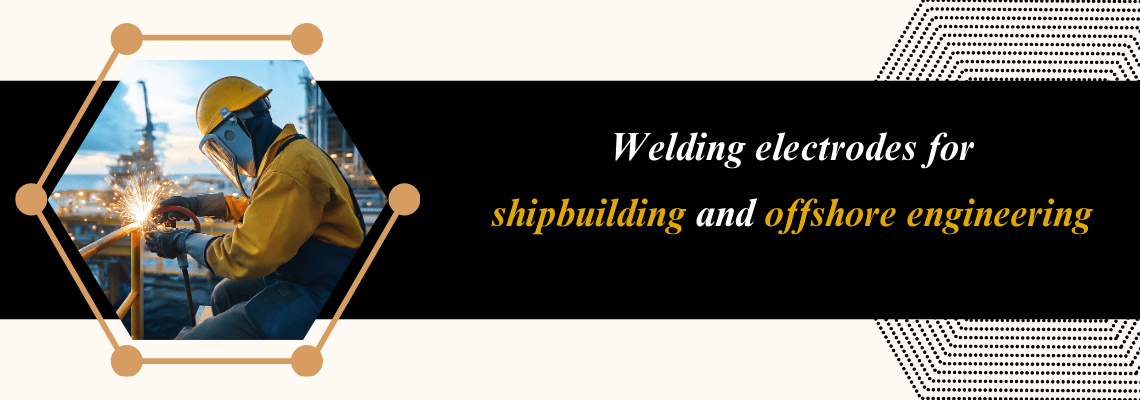Welding plays a critical role in the shipbuilding and offshore engineering industries. From constructing massive ocean vessels to building intricate offshore platforms, the quality of welding can determine the durability and safety of these structures. Central to the welding process are welding electrodes, the materials that facilitate the welding process and ensure strong, reliable joints. In this article, we will delve into the importance of welding electrodes for shipbuilding and offshore engineering, explore different types of electrodes, and discuss how to select the right electrode for specific applications.
The Importance of Welding Electrodes in Shipbuilding
Shipbuilding is an industry that demands precision, strength, and durability. The integrity of a ship’s hull, deck, and other structures depends heavily on the quality of the welding. Welding electrodes are the materials that carry the electric current to the workpiece, creating the arc that melts the metals to be joined. In shipbuilding, where large, thick sections of steel are often joined, the choice of electrode can make a significant difference in the quality of the weld.
For example, ships are exposed to harsh marine environments, including saltwater, which can cause corrosion. Welding electrodes that produce welds with high resistance to corrosion are essential to ensure the longevity of the ship’s structure. Moreover, the ability to weld efficiently in various positions—such as vertical, horizontal, and overhead—is crucial in shipbuilding due to the complex shapes and angles involved.
Types of Welding Electrodes for Offshore Engineering
Offshore engineering encompasses the construction and maintenance of structures like oil rigs, drilling platforms, and wind farms located in the ocean. The welding electrodes used in these projects must meet strict standards to ensure the safety and durability of the structures in some of the most challenging environments on Earth.
- E6010 and E6011 Electrodes: These are commonly used for welding pipelines and structural components in offshore platforms. They provide deep penetration and are ideal for welding through rust, oil, and paint, making them suitable for maintenance and repair work on offshore structures.
- E7018 Electrodes: Known for producing strong, ductile welds, E7018 electrodes are widely used in both shipbuilding and offshore engineering. They are especially suitable for welding thicker materials and are often used in the construction of critical components like the main hull of ships and the legs of offshore platforms.
- Stainless Steel Electrodes: In offshore engineering, where structures are constantly exposed to seawater, stainless steel electrodes are often used to provide corrosion-resistant welds. These electrodes are particularly important in welding parts of offshore structures that are submerged or exposed to the splash zone.
- Nickel-Based Electrodes: These electrodes are used for welding components that will be exposed to extreme temperatures or corrosive environments, such as subsea pipelines and pressure vessels in offshore engineering. Nickel-based welds are highly resistant to cracking and corrosion.
Choosing the Right Welding Electrode for Shipbuilding
Selecting the appropriate welding electrode for shipbuilding requires careful consideration of several factors, including the type of material being welded, the welding position, and the specific requirements of the ship’s design.
- Material Compatibility: The electrode must be compatible with the material being welded. For example, low-carbon steel electrodes are suitable for welding most shipbuilding steels, while stainless steel electrodes are necessary for welding stainless steel components.
- Welding Position: The ship’s structure may require welding in various positions, such as overhead, vertical, or horizontal. Electrodes designed for all-position welding, like E7018, are often preferred in shipbuilding due to their versatility.
- Mechanical Properties: The mechanical properties of the weld, such as tensile strength, impact resistance, and ductility, must meet the specific requirements of the ship. For instance, welds on a ship’s hull must be strong enough to withstand the forces exerted by waves and currents.
- Environmental Considerations: The marine environment poses unique challenges, including corrosion and fatigue. Welding electrodes that produce welds with high resistance to these factors are essential in shipbuilding.
Welding Electrode Considerations for Offshore Engineering

Offshore structures are subjected to extreme environmental conditions, making the choice of welding electrodes even more critical. Here are some key considerations:
- Corrosion Resistance: Offshore structures are continuously exposed to seawater, which can cause severe corrosion. Stainless steel electrodes or nickel-based electrodes are often used to provide corrosion-resistant welds.
- Fatigue Resistance: Offshore structures, such as drilling platforms, experience constant movement due to waves and wind. Welding electrodes that produce welds with high fatigue resistance are crucial to prevent cracking and ensure the longevity of the structure.
- Temperature Variations: Offshore structures may be exposed to extreme temperatures, both hot and cold. Nickel-based electrodes are ideal for welding components that will be subjected to these temperature variations, as they maintain their strength and ductility across a wide temperature range.
- Structural Integrity: The structural integrity of offshore platforms and subsea pipelines is of utmost importance. The welding electrodes used must produce welds that are not only strong but also resistant to cracking and other forms of failure.
Welding Techniques and Best Practices
To ensure the highest quality welds in shipbuilding and offshore engineering, it is essential to follow best practices in welding techniques. This includes proper preparation of the welding surface, correct electrode storage, and adherence to welding procedures.
- Surface Preparation: The welding surface must be clean and free of contaminants like rust, oil, and paint. This ensures a strong bond between the electrode and the base metal.
- Electrode Storage: Welding electrodes must be stored in a dry, controlled environment to prevent moisture absorption, which can lead to weld defects such as porosity and cracking.
- Welding Procedures: Following established welding procedures is critical to achieving consistent, high-quality welds. This includes using the correct welding parameters, such as current, voltage, and travel speed, as specified for the electrode type.
Innovations in Welding Electrodes for Shipbuilding and Offshore Engineering

The development of advanced welding electrodes has significantly improved the efficiency and quality of welding in shipbuilding and offshore engineering. Innovations include electrodes with enhanced mechanical properties, such as improved toughness and corrosion resistance, as well as electrodes designed for automated and robotic welding systems.
- High-Strength Electrodes: New formulations of welding electrodes offer higher tensile strength and impact resistance, making them ideal for critical welds in shipbuilding and offshore engineering.
- Corrosion-Resistant Coatings: Advances in electrode coatings have led to the development of electrodes that produce welds with superior corrosion resistance, essential for offshore structures exposed to harsh marine environments.
- Automation-Friendly Electrodes: As the shipbuilding and offshore industries increasingly adopt automated and robotic welding systems, the demand for electrodes that perform well in these systems has grown. These electrodes are designed to provide consistent, high-quality welds with minimal spatter and defects.
Challenges in Welding for Shipbuilding and Offshore Engineering
Despite advances in welding technology, several challenges remain in the shipbuilding and offshore engineering industries. These challenges include the need for skilled welders, the complexity of welding in confined spaces, and the difficulty of inspecting welds in offshore environments.
- Skilled Labor Shortage: The shipbuilding and offshore engineering industries require highly skilled welders who can produce high-quality welds in challenging conditions. However, there is a growing shortage of skilled labor in these industries.
- Welding in Confined Spaces: Shipbuilding often involves welding in tight, confined spaces where access is limited. This makes it difficult to achieve the correct welding angles and can lead to defects if not done correctly.
- Weld Inspection: Inspecting welds in offshore environments can be challenging due to the remote locations and harsh conditions. Advanced inspection techniques, such as ultrasonic testing and radiography, are often required to ensure the integrity of the welds.
The Future of Welding Electrodes in Shipbuilding and Offshore Engineering
The future of welding electrodes in shipbuilding and offshore engineering looks promising, with continued advancements in materials science and welding technology. The development of new electrode formulations that offer improved performance in harsh environments will continue to drive innovation in these industries.
- Sustainable Welding Practices: As environmental concerns become more pressing, the shipbuilding and offshore industries are adopting more sustainable welding practices. This includes the use of low-emission electrodes and techniques that minimize waste and energy consumption.
- Smart Welding Technologies: The integration of smart technologies, such as sensors and real-time monitoring systems, is revolutionizing the welding process. These technologies enable more precise control of welding parameters, resulting in higher quality welds and reduced defects.
- Advanced Materials: The development of new materials, such as high-strength, lightweight alloys, will require the use of specialized welding electrodes capable of handling these advanced materials.
Welding electrodes are the backbone of the welding process in shipbuilding and offshore engineering. The choice of electrode can have a profound impact on the strength, durability, and safety of the final structure. By understanding the different types of welding electrodes available and selecting the right one for the job, shipbuilders and offshore engineers can ensure that their projects stand the test of time in some of the most demanding environments on Earth.






